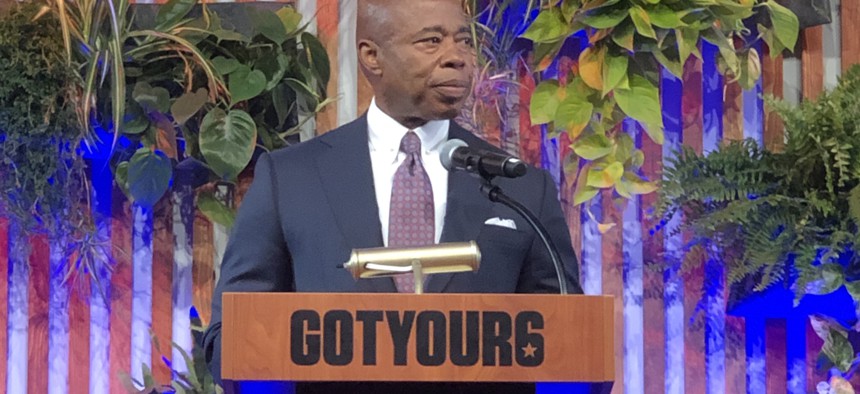Nonprofits
Summit focuses on veterans services
Food insecurity was among the top priorities at the event hosted by the Bob Woodruff Foundation and New York City Department of Veterans’ Services

Phenix Kim
Food insecurity for veterans was among the top issues discussed at an event hosted by the Bob Woodruff Foundation and the New York City Department of Veterans’ Services Wednesday.
Dubbed, the GotYour6 Summit, the event at the Metropolitan Pavilion gathered nonprofit leaders and city officials, including Mayor Eric Adams, to discuss issues impacting veterans, as well as enlisted members of the military. The summit was named after the Woodruff Foundation’s Got Your 6 Network, a service that connects grantors and local partners to provide support to veterans, service members, and their families.
Food insecurity among veterans remained a top priority among the issues raised, along with keeping veterans issues relevant amidst negative stigmas and a lack of educated awareness among policymakers. Anne Marie Dougherty, CEO of the Bob Woodruff Foundation, opened the conference by highlighting the foundation’s commitment as one of nation’s largest nonprofits serving veterans and their families
“There's three messages that I hope you all take away from today. Louder, longer, network. There is a lot that we can do individually but there's even more we can do if we work together. And most importantly, by understanding what we individually provide, we can help veterans efficiently navigate through the web of offerings.”
CNN Political Analyst John Avlon and General George W. Casey, former chief of staff of the Army, followed this sentiment of cooperation among nonprofits, urging for collaborative solutions among local organizations and policymakers:
“It's about how many different stakeholders there are and how difficult it is to shape veterans policy. But the VA (Department of Veterans’ Affairs), the Department of Defense VSOs (Veterans Services Organizations) and the veterans committees in Congress is the group that needs to come together.”
Casey also spoke of the impact of shifting demographics within the veteran population. As the military reaps the benefits of a better educated force, the sharp decline of the veteran population – reaching just under 18 million, representing a 6% decline from the 1980s, makes it difficult to retain the social relevance of a smaller isolated force that faces a myriad of novel and systemic issues.
Among the most familiar and most urgent problems addressed was the availability of adequate food supplies to veterans, who suffer from a variety of mental and physical disabilities. A panel of industry leaders led by Bob Woodruff, founder of the Woodruff Foundation and Craig Newmark, founder of Craiglist, tackled this question by advocating for tailored programs and food pantries that would deliver resources directly to veterans, many of whom suffer from Post Traumatic Stress Disorder.
Among them was Karen Pearl, CEO of God's Love We Deliver, a nonprofit that has been delivering meals to New Yorkers since 1985, especially veterans in New York State. Pearl spoke of the importance of creating specific partnerships with the Department of Veterans Affairs, to not only alleviate food insecurity but by providing meals that align with each veteran’s specific needs.
“They are sick and they are unable to shop or cook for themselves because of either some mental health issue or some physical issue that is the result of having served. And so these are people for whom a home delivered nutritious meal changes their lives. Because it's not just getting food, it's getting the right food for their particular medical circumstances.”
As the COVID-19 pandemic destabilized food production, this exacerbated ongoing food insecurity among veterans across the country. In addition, homelessness and social stigmas have stunted veterans from receiving the aid they need. Jeremy Butler, CEO of Iraq and Afghanistan Veterans of America, spoke of this from personal experience as a Navy Veteran.
“Veterans are really brave people. And it takes an enormous act of bravery to call and say I need help. But it's particularly hard when you've built your whole career on being brave and helping others. We've done a lot of training with veteran organizations so that our staff can help facilitate that without it feeling like a stigma, that it just feels like a service that people opt out if they need it.”
Regarding the future of veteran services, Avlon and Casey emphasized a shift in tone “to change our posture from one of seeing veterans as assets, not to people who are looking for benefits,” said Avlon. Casey also stressed a lack of military representation in Congress as one of the main obstacles preventing veteran issues from gaining greater exposure.
“How do you recommend we keep better issues from veterans issues from the center in the national conversation when fewer and fewer people have served? The VSOs and the VA need to educate those men and women to the representatives in Congress so they understand the needs of veterans.”
Adams also spoke patriotically in of the foundation’s efforts in bringing light to veteran issues:
“[Got your six] is a saying that we want to come together with a series of groups and organizations that really have the backs of the men and women who have served, particularly here in the city, one of the only cities with a separate agency for veterans. I'm proud to be here today to be a part of [Got Your Six]. Our coordination can alleviate if not eradicate some of the issues that our veterans are facing.”
In addition, Newmark and Dougherty also brought light to noteworthy expansions among veterans’ issues—namely the importance of cybersecurity education and the growing need for fertility services among Veteran families, respectively.
Dougherty spoke at length of the Woodruff Foundation’s Veterans In Vitro Iniative, which works in collaboration with the Department of Veterans Affairs, to provide medical services and financial assistance to veteran couples faced with service-connected fertility challenges.
These initiatives show an expansion of veteran care, reaching beyond individuals servicemen and women to families and caregivers.
